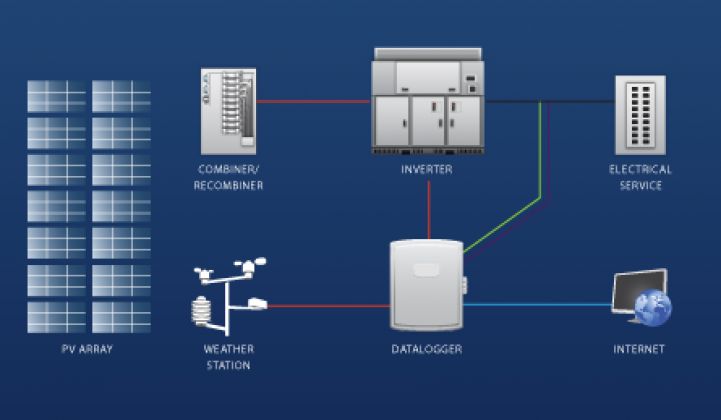Innovation is rare in the solar PV monitoring space, where the difference between competing products is often based on detailed features and functions, leaving the impression that all solutions are very similar.
But the latest product announcement from Locus Energy has made a big splash and may change the game in the U.S. residential PV monitoring market.
Locus is the top-ranked independent monitoring provider in the U.S. residential segment based on GTM Research’s latest report, Global PV Monitoring: Technologies, Markets and Leading Players, 2013-2017. The firm’s current solution for home PV monitoring consists of a revenue-grade meter that plugs into a homeowner’s internet connection.
This approach enables rich functionality at a low cost, but its dependence on the local network makes it vulnerable to events such as changes in router settings, customers switching to another internet provider -- or even simply unplugging an Ethernet cable.
The main competing alternative so far has been Itron’s Solar Meter, a classic socket meter equipped with built-in cellular communications. This approach cuts the dependence on the homeowner’s internet connection, but it also introduces new limitations such as a reduced set of data, a fixed measurement interval of fifteen minutes and a lag time in data reporting. In order to keep cellular costs low, the information is retrieved only once or twice a day.
In addition, Itron’s hardware does not connect to inverters; it is a platform for metering, not for monitoring. And with meter data alone, the ability to remotely diagnose a PV system issue remains limited. Solar PV monitoring firms Also Energy and DECK Monitoring recently announced integration with the Itron solar meters. Even Locus supports these devices; however, the functionality of all these solutions is bound to the same Itron hardware and data collection limitations.
In other words, so far U.S. PV system owners and operators have had to choose between Locus, a feature-rich metering and monitoring platform with reliability issues due to its dependency on the homeowner’s network, or another monitoring platform based on Itron, a highly reliable cellular metering solution with limited data and little troubleshooting capability.
The Lgate 120 product announced by Locus today seems to resolve this dilemma.
The new hardware is a socket meter with built-in cellular and Ethernet connectivity that also integrates with inverters via a serial RS485 or ZigBee interface. With this new platform Locus reduces cellular data costs by compressing data into an optimized solar-focused packet. Where cellular service is not available or not desired, ethernet connection is still available.
Locus offers five-minute data intervals, and its "low-bandwidth" cost-saving option transmits data seven times daily during sunlight hours, offering higher granularity and faster reporting than any cellular-based solution currently available. Add to this the ability to collect inverter data and faults for remote diagnosis and troubleshooting, and Locus may very well have created the ideal hardware and communications solution for residential PV monitoring.
The new Lgate 120 could lead the way for a new generation of residential PV metering and monitoring hardware for solar leasing and power purchase agreement firms.
Will it take the market by storm? We will soon find out: Locus announces product availability in Q4 at a starting price of $300 for volume orders.
For more competitive analysis on PV monitoring technologies and the companies active in the market, learn more about our new report, Global PV Monitoring: Technologies, Markets and Leading Players, 2013-2017.
***
Cedric Brehaut is a consultant and market analyst with SoliChamba. He is an expert in PV systems monitoring with extensive experience in the solar industry and over fifteen years in the software business.
Note: The author has no business relationship with Locus.



